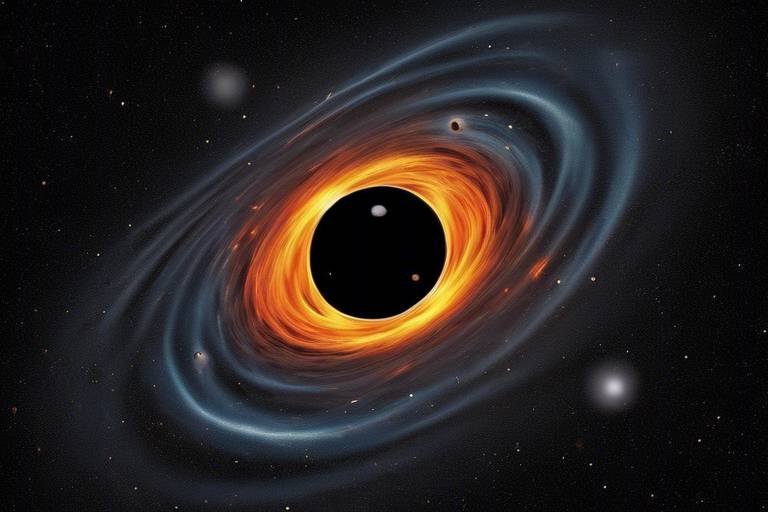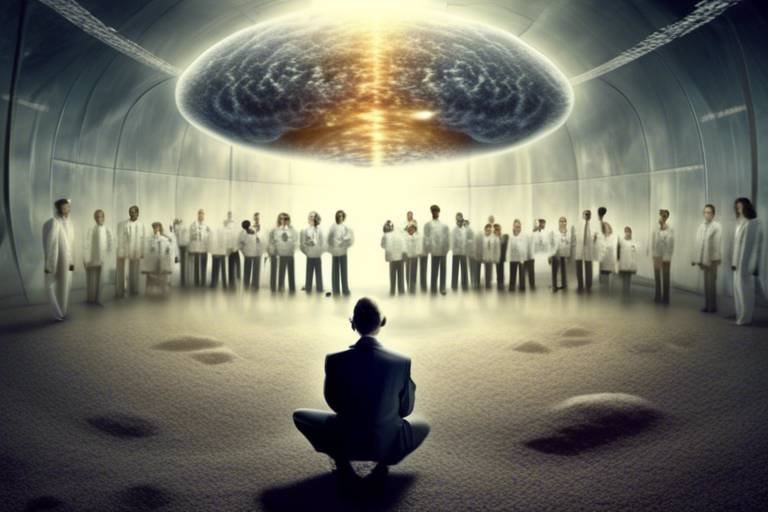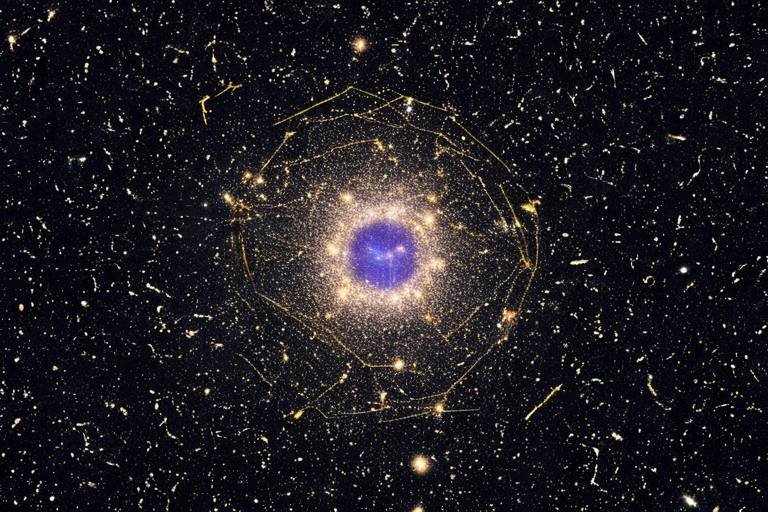Philosophy and Physics - Unraveling the Mystery of Black Holes
Welcome to a journey that intertwines the realms of philosophy and physics as we delve into one of the universe's most captivating enigmas: black holes. These cosmic giants are not just fascinating objects in the night sky; they are profound puzzles that challenge our understanding of reality itself. What are they? How do they exist? And more importantly, what do they mean for our perception of existence? In this article, we will explore the intriguing intersection of these two fields, unraveling the mysteries that black holes hold while pondering the deeper questions they raise about our universe.
So, what exactly is a black hole? At its core, a black hole is a region in space where the gravitational pull is so immense that nothing—not even light—can escape from it. Imagine a vacuum cleaner that doesn't just suck up dust but devours everything in its vicinity, including entire stars. This gravitational force is a result of a massive amount of matter being compressed into an incredibly small area, often following the death of a massive star. As we dive deeper into the characteristics of black holes, we discover various types, including stellar black holes, supermassive black holes, and intermediate black holes. Each type presents its own set of mysteries and challenges our understanding of the cosmos.
The mere existence of black holes invites us to ponder significant philosophical questions. For instance, they challenge our concepts of determinism and causality. If something can fall into a black hole and seemingly disappear, what does that mean for our understanding of cause and effect? Do black holes represent a breakdown of the laws of physics as we know them? These questions are not just academic; they strike at the heart of how we understand reality itself. As we explore these cosmic phenomena, we find ourselves at a crossroads between science and philosophy, where each discipline informs and enriches the other.
One of the most mind-bending aspects of black holes is their ability to warp spacetime, leading to time dilation. This phenomenon suggests that the closer you get to a black hole, the slower time moves relative to an outside observer. Imagine standing on the edge of a black hole while your friend watches from a safe distance. For you, minutes might feel like hours, or even years, for your friend. This raises existential questions: What is the true nature of time? Is it a constant, or is it something that can be manipulated? As we grapple with these ideas, we begin to see time not just as a linear progression but as a complex tapestry woven into the fabric of the universe.
As we navigate the waters of time dilation, we encounter temporal paradoxes. These paradoxes, such as the possibility of time travel, challenge our conventional understanding of time. If one could theoretically enter a black hole and emerge in a different time period, what would that mean for our understanding of history and causality? Would actions taken in the past affect the present? The implications are staggering and invite us to reconsider our understanding of time as a fixed entity.
The relationship between black holes and time prompts philosophical inquiries about the very essence of time. Is it an absolute dimension, or is it relative and dependent on the observer? Various philosophical theories, from Newtonian concepts to Einstein's relativity, provide different perspectives on time. In the context of black holes, these theories take on new meanings, challenging us to rethink our assumptions and consider the possibility that time may be more fluid than we ever imagined.
Another intriguing aspect of black holes is the black hole information paradox. This paradox arises from the question of whether information that falls into a black hole is lost forever. In physics, the principle of information conservation is fundamental; however, if black holes can erase information, it would upend our understanding of the universe. This paradox not only raises questions about the nature of information but also challenges the very foundations of physics and philosophy.
Quantum mechanics plays a crucial role in our quest to understand black holes. It introduces a layer of complexity that classical physics alone cannot explain. For example, the behavior of particles at a quantum level reveals fascinating insights into how black holes might operate. The intersection of quantum theories with classical physics provides a richer understanding of black hole behavior and their implications for the universe.
One of the most promising areas of research involves quantum entanglement. This phenomenon suggests that particles can become interconnected in ways that transcend space and time. Could entangled particles hold the key to unlocking the mysteries of black holes? This question remains at the forefront of scientific inquiry, and as researchers delve deeper, we may find that the secrets of black holes are intricately tied to the fundamental principles of quantum mechanics.
Lastly, we cannot discuss black holes without mentioning Hawking radiation, a groundbreaking theory proposed by physicist Stephen Hawking. This theory posits that black holes can emit radiation, leading to the possibility that they may not be as permanent as once thought. If black holes can evaporate over time, what does that mean for the information they contain? This idea challenges traditional views and opens up new avenues for understanding the universe.
- What is a black hole? A black hole is a region in space where gravitational forces are so strong that nothing, not even light, can escape.
- Can we see black holes? While we cannot see black holes directly, we can observe their effects on nearby stars and gas.
- What happens if you fall into a black hole? Falling into a black hole would lead to extreme gravitational forces, likely resulting in spaghettification, where you would be stretched thin.
- Are black holes permanent? According to Hawking's theory, black holes can emit radiation and eventually evaporate over time.

The Nature of Black Holes
Black holes are some of the most fascinating and mysterious objects in the universe. They are not just cosmic vacuum cleaners; they are regions in space where the gravitational pull is so intense that nothing, not even light, can escape their grasp. Imagine a point in space where the fabric of reality itself seems to tear, creating a void that swallows everything around it. This is the essence of a black hole.
To understand black holes, we first need to grasp their formation. Typically, they are born from the remnants of massive stars that have exhausted their nuclear fuel. When a star runs out of energy, it can no longer support itself against the force of gravity, leading to a catastrophic collapse. This collapse compresses the star's core to an infinitely small point known as a singularity, surrounded by an event horizon—the boundary beyond which nothing can escape.
The characteristics of black holes can be summarized in a few key points:
- Singularity: The core where density is thought to be infinite.
- Event Horizon: The point of no return; once crossed, escape is impossible.
- Mass: Black holes can vary in size from a few times the mass of our Sun to millions or even billions of solar masses.
- Spin and Charge: Black holes can also have angular momentum (spin) and electric charge, adding complexity to their behavior.
One of the most intriguing aspects of black holes is their ability to warp spacetime. According to Einstein's theory of general relativity, massive objects like black holes can bend the fabric of spacetime around them, creating a sort of "well" that other objects fall into. This warping effect leads to some mind-bending phenomena, such as gravitational lensing, where the light from distant stars is bent around the black hole, allowing us to observe objects that would otherwise be hidden behind it.
Moreover, black holes come in various types, each with unique characteristics. These include:
| Type of Black Hole | Description | Formation |
|---|---|---|
| Stellar Black Holes | Formed from collapsing massive stars. | Supernova explosions. |
| Supermassive Black Holes | Millions to billions of solar masses. | Formed in the centers of galaxies. |
| Intermediate Black Holes | Mass between stellar and supermassive black holes. | Formation models are still under investigation. |
| Primordial Black Holes | Hypothetical black holes formed soon after the Big Bang. | High-density fluctuations in the early universe. |
In summary, black holes are not just cosmic oddities; they are essential to our understanding of the universe. They challenge our perceptions of space and time, leading us to question the very nature of existence. As we continue to study these incredible entities, we inch closer to unraveling the mysteries they hold.
- What is a black hole? A black hole is a region in space with a gravitational pull so strong that nothing can escape from it.
- How are black holes formed? They typically form from the remnants of massive stars after they undergo a supernova explosion.
- Can we see black holes? While we cannot see black holes directly, we can observe their effects on nearby stars and gas.
- What happens if you fall into a black hole? Falling into a black hole would lead to spaghettification, where you would be stretched and compressed due to extreme gravity.

Philosophical Implications of Black Holes
Black holes are not just cosmic vacuum cleaners; they are profound enigmas that challenge our very understanding of existence and reality. Their existence raises a myriad of philosophical questions that go beyond the realm of physics. For instance, when we consider the immense gravitational pull of a black hole, we are forced to confront the concept of determinism. If a black hole can consume everything in its vicinity, what does that say about our ability to predict future events? Are our fates sealed, or do we still possess free will in a universe where such powerful forces exist?
Moreover, the nature of causality comes into play. The idea that an object can fall into a black hole and never return challenges the traditional cause-and-effect relationship we rely on. If information can be lost to a black hole, then how do we reconcile that with our understanding of the universe as a coherent entity? This leads us to ponder whether reality itself is as solid and reliable as we once thought. The implications are staggering, suggesting that our grasp of reality may be as fluid as the spacetime fabric that black holes warp.
To further illustrate this, consider the concept of time. Black holes warp spacetime in such dramatic ways that they create a time dilation effect. Imagine standing at the edge of a black hole, where time flows differently. For an observer falling into the black hole, time would seem to slow down, while for someone watching from a distance, it would appear as though the person falling in is frozen in time. This leads us to ask: what does it mean to experience time? Is our perception of time merely an illusion shaped by our surroundings?
These reflections lead us to explore temporal paradoxes. If black holes allow for time travel—albeit in a theoretical sense—what does that mean for our understanding of past and future? Can we change our past, or are we merely observers in a predetermined timeline? The philosophical implications are vast, raising questions about the very fabric of our existence and the choices we make.
Lastly, we cannot ignore the philosophy of time itself. The relationship between black holes and time prompts us to consider various philosophical theories regarding time. For instance, some philosophers argue that time is linear, while others propose that it is cyclical or even non-linear. Black holes, with their ability to bend and twist spacetime, challenge these notions and invite us to rethink our assumptions about the nature of time. Are we merely passengers on a linear track, or is time a complex tapestry woven into the fabric of the universe?
In summary, black holes serve as a fascinating intersection between physics and philosophy, forcing us to confront profound questions about determinism, causality, and the very nature of reality itself. As we continue to delve into the mysteries of these cosmic phenomena, we may find that the answers lie not just in equations and theories, but in the philosophical implications that challenge our understanding of existence.

Time Dilation and Reality
Imagine standing on the edge of a black hole, a place where the laws of physics as we know them start to bend and twist. The concept of time dilation is one of the most mind-boggling aspects of black holes, challenging our very understanding of reality. According to Einstein's theory of relativity, time is not a constant; it can stretch and contract depending on the strength of gravitational fields. Near a black hole, where gravity is incredibly intense, time behaves in ways that seem almost magical. For someone falling into a black hole, time would appear to slow down dramatically compared to an observer far away. This leads us to ponder: if time can be so flexible, what does that mean for our perception of existence?
As we delve deeper into this enigma, we must consider the implications of time dilation on our understanding of reality. When we think of time, we often see it as a linear progression—past, present, and future. However, near a black hole, this linearity is disrupted. The closer you get to the event horizon, the more pronounced the effects of time dilation become. To an outside observer, someone falling into a black hole could appear to freeze in time, while they themselves experience the passage of time normally. This leads to a fascinating question: if time is subjective, can we truly say that our experiences are universal?
Furthermore, this phenomenon raises intriguing philosophical questions about the nature of reality itself. Are our perceptions of time and existence merely illusions shaped by our environment? If time can be manipulated, does that mean our understanding of cause and effect—of what is real and what is not—needs to be reevaluated? The implications are profound, suggesting that reality might be a more fluid concept than we ever imagined.
To illustrate the effects of time dilation, consider the following table that summarizes how time behaves at various distances from a black hole:
| Distance from Black Hole (in Schwarzschild Radius) | Time Dilation Factor | Observer's Experience |
|---|---|---|
| 1 | 1x | Normal passage of time |
| 2 | 2x | Time slows down slightly |
| 3 | 4x | Significant time dilation |
| Event Horizon | ∞ | Time appears to stop |
This table highlights the dramatic differences in time perception as one approaches a black hole. The closer one gets to the event horizon, the more surreal the experience becomes. It’s as if the universe is playing a game, teasing us with the very fabric of reality. So, what does this mean for our understanding of existence? Are we merely passengers on a cosmic ride, subject to the whims of time and space?
In conclusion, the study of time dilation in the context of black holes not only challenges our scientific understanding but also invites us to explore deeper philosophical questions about the nature of reality. As we continue to unravel these mysteries, we may find that our perception of time is just one piece of a much larger puzzle—one that could redefine our understanding of existence itself.
- What is time dilation? Time dilation is the phenomenon where time passes at different rates depending on the gravitational field strength and relative velocity of observers.
- How does time dilation affect our perception of reality? Time dilation can cause individuals to experience time differently, leading to questions about the nature of reality and existence.
- Can we travel through time using black holes? Theoretical physics suggests that black holes could allow for time travel, but this remains speculative and unproven.
- What is the event horizon? The event horizon is the boundary around a black hole beyond which nothing can escape, not even light.

Temporal Paradoxes
When we dive into the realm of black holes, we encounter a mind-bending phenomenon known as . Imagine for a moment that you could step into a black hole and emerge not just in another part of the universe, but in a different time altogether. This idea isn't just science fiction; it raises profound questions about the very fabric of time and our understanding of causality. The concept of time travel, once relegated to the pages of novels, suddenly becomes a tantalizing possibility when viewed through the lens of black holes.
One of the most famous temporal paradoxes is the grandfather paradox. Picture this: you travel back in time and inadvertently prevent your grandfather from meeting your grandmother. If that happens, you would never be born, which means you couldn't have traveled back in time in the first place. This cyclical conundrum challenges our conventional understanding of time as a linear progression. Black holes, with their ability to warp spacetime, only complicate this issue further.
Additionally, consider the implications of time dilation. Near a black hole, time doesn’t tick at the same rate as it does on Earth. To an observer far away, someone falling into a black hole appears to slow down and never quite crosses the event horizon. This effect can lead to situations where an individual could theoretically witness events unfold in the universe while they themselves experience time at a drastically different rate. It’s as if you’re watching a movie on fast forward while you’re stuck in slow motion!
Moreover, the very existence of black holes suggests a universe where time isn’t just a straight path but a complex web of possibilities. If we accept that time can be bent and twisted, we must also grapple with the implications for our understanding of reality. Are we simply passengers on a timeline, or do we have the power to alter our paths? The answers may lie in the heart of these cosmic giants.
In summary, the exploration of temporal paradoxes in relation to black holes opens up a Pandora's box of philosophical inquiries. It challenges us to rethink how we perceive time and reality itself. As we continue to study these enigmatic entities, we may find that the universe is far more intricate than we ever imagined. The intersection of physics and philosophy invites us to ponder not just the mechanics of the cosmos, but our place within it.
- What is a temporal paradox? A temporal paradox refers to a situation where time travel creates contradictions in the timeline, such as preventing one's own existence.
- How do black holes affect time? Black holes warp spacetime, causing time to pass differently for observers depending on their proximity to the black hole.
- Can time travel be possible through black holes? While theoretically possible, time travel through black holes remains speculative and is not currently supported by empirical evidence.
- What are some examples of temporal paradoxes? Common examples include the grandfather paradox and the bootstrap paradox, where events are self-causing.

Philosophy of Time
The relationship between black holes and time is a fascinating subject that invites deep philosophical inquiry. Time, as we understand it, is often seen as a linear progression—past, present, and future flowing in a seamless continuum. However, when we introduce black holes into this equation, everything we thought we knew about time is put to the test. Imagine standing at the edge of a black hole, where the gravitational pull is so intense that it bends the very fabric of spacetime. Here, time behaves in ways that challenge our conventional understanding.
To grasp the philosophical implications of time in the context of black holes, we must first consider a few key theories:
- Presentism: This theory posits that only the present moment is real, while the past and future are mere illusions. In the realm of black holes, where time can stretch and warp, how does presentism hold up? Can we truly claim that the present exists if it can be altered by such cosmic phenomena?
- Eternalism: Contrary to presentism, eternalism suggests that past, present, and future are equally real. This perspective aligns intriguingly with the behavior of black holes, where events may be perceived differently depending on one's position in spacetime. What does this mean for our understanding of reality?
- Relational Time: This theory posits that time is not an absolute entity but rather a relationship between events. In the context of black holes, this raises questions about how time is experienced by observers at different distances from the event horizon. Does time exist independently, or is it merely a construct of our experiences?
These theories invite us to ponder profound questions: If time can be distorted by gravitational forces, what does that mean for our understanding of causality? Are our memories of the past truly reliable if they can be influenced by the gravitational pull of a black hole? The very nature of existence is called into question when we consider that time may not be as linear as we once believed.
Moreover, the implications of black holes extend beyond just theoretical musings. They compel us to reassess our place in the universe. Are we mere observers in a cosmic drama, or do we play an active role in shaping reality? The philosophy of time, intertwined with the enigma of black holes, pushes us to confront the limitations of human understanding and the vastness of the cosmos.
In conclusion, the philosophy of time in relation to black holes is not merely an academic exercise; it is a journey into the depths of existence itself. As we continue to explore these cosmic mysteries, we must remain open to the possibility that our understanding of time—and reality—may be forever changed.
- What is a black hole? A black hole is a region in space where the gravitational pull is so strong that nothing, not even light, can escape from it.
- How do black holes affect time? Black holes warp spacetime, leading to time dilation effects that can alter our perception of time.
- What are the philosophical implications of black holes? Black holes challenge our understanding of determinism, causality, and the nature of reality itself.
- Can time travel occur near a black hole? The extreme conditions near a black hole lead to temporal paradoxes that raise questions about the possibility of time travel.

Information Paradox
The black hole information paradox is one of the most perplexing and debated topics in modern physics. At its core, this paradox questions whether information that falls into a black hole is lost forever or if it can be recovered in some form. Imagine tossing a book into a black hole. Is the information contained in that book—its words, ideas, and stories—permanently erased from the universe, or does it somehow remain intact, waiting to be discovered? This conundrum has sparked intense discussions among physicists and philosophers alike, igniting a quest for answers that could redefine our understanding of reality itself.
According to classical physics, when something crosses the event horizon of a black hole, it is effectively cut off from the rest of the universe. This led to the troubling conclusion that the information about the physical state of that object is lost. However, quantum mechanics, which governs the behavior of particles at the smallest scales, suggests that information cannot be destroyed. This contradiction poses a significant challenge, leading to profound implications for the fundamental principles of physics.
To illustrate the crux of the issue, consider the following points:
- Determinism vs. Quantum Mechanics: In a deterministic universe, every event is a consequence of prior events, implying that information should always be recoverable. Yet, black holes seem to defy this notion.
- Hawking Radiation: Stephen Hawking proposed that black holes can emit radiation, suggesting they might eventually evaporate. If this happens, what becomes of the information? Is it lost forever, or is it somehow encoded in the radiation?
- Black Hole Complementarity: This theory posits that information is preserved in two different ways: one for observers outside the black hole and another for those who fall in. This raises questions about the nature of reality and observation.
As scientists grapple with these challenges, various theories have emerged to address the paradox. Some propose that information is not lost but rather transformed in ways we do not yet fully understand. Others suggest that the information might be stored on the event horizon, a concept known as the holographic principle. This principle implies that the universe might be a two-dimensional information structure "projected" into three dimensions, leading to a radical rethinking of how we perceive space and time.
Ultimately, the black hole information paradox serves as a reminder of the limits of our understanding. It invites us to ponder the nature of reality, the fabric of the universe, and our place within it. As we continue to explore these cosmic mysteries, we may find that the answers not only reshape our understanding of black holes but also illuminate the very essence of existence itself.
1. What is the black hole information paradox?
The black hole information paradox questions whether information that falls into a black hole is permanently lost or can be recovered. It highlights a conflict between classical physics and quantum mechanics.
2. How does Hawking radiation relate to the information paradox?
Hawking radiation suggests that black holes can emit radiation and may eventually evaporate. This raises questions about what happens to the information that fell into the black hole.
3. What is the holographic principle?
The holographic principle posits that all the information contained within a volume of space can be represented as a theory on the boundary of that space, suggesting a deeper understanding of the universe's structure.
4. Can we ever resolve the information paradox?
While many theories exist, there is currently no consensus among physicists. Ongoing research in quantum gravity and related fields may eventually provide answers.

The Role of Quantum Mechanics
When we dive into the mysterious world of black holes, we can’t ignore the profound role that quantum mechanics plays in our understanding of these cosmic giants. At first glance, black holes seem to belong to the realm of classical physics, where gravity reigns supreme, and the rules are straightforward. However, once we introduce the quirky principles of quantum mechanics, everything changes, and the universe reveals its astonishing complexity.
To grasp the significance of quantum mechanics in the context of black holes, we must first understand that these entities are not just simple voids in space; they are intricate systems governed by both gravitational and quantum forces. For instance, the very nature of black holes challenges our classical notions of space and time. Imagine a fabric stretched taut, and then suddenly, a massive object like a star is placed on it. The fabric warps, creating a deep well—this is analogous to how black holes warp spacetime. But what happens at the quantum level? That's where things get really fascinating.
One of the most significant intersections between quantum mechanics and black holes is the concept of quantum entanglement. This phenomenon suggests that particles can become intertwined in such a way that the state of one particle instantly influences the state of another, no matter the distance between them. So, how does this relate to black holes? Well, it raises questions about the information that falls into a black hole. If information is lost when something crosses the event horizon, as some theories suggest, it would contradict the principles of quantum mechanics, which state that information cannot be destroyed. This conundrum is known as the black hole information paradox.
Moreover, the famous physicist Stephen Hawking introduced the concept of Hawking radiation, suggesting that black holes aren’t entirely black but can emit radiation due to quantum effects near the event horizon. This phenomenon implies that black holes can gradually lose mass and may eventually evaporate over astronomical timescales. It's a groundbreaking idea that merges quantum mechanics with the fate of black holes, challenging our traditional views of these celestial objects as eternal prisons.
To illustrate the relationship between quantum mechanics and black holes, consider the following table summarizing key concepts:
| Concept | Description |
|---|---|
| Quantum Entanglement | Particles can be interconnected, influencing each other's states regardless of distance. |
| Black Hole Information Paradox | The dilemma of whether information is lost when something falls into a black hole. |
| Hawking Radiation | Black holes can emit radiation due to quantum effects, leading to gradual mass loss. |
As we contemplate these concepts, we can’t help but wonder: what does this mean for our understanding of the universe? The interplay of quantum mechanics and black holes invites us to reconsider the very fabric of reality. Are we on the brink of a new understanding that could unify the laws of physics? Or are we merely scratching the surface of a deeper mystery? The answers remain elusive, yet the journey of exploration is as thrilling as it is profound.
In conclusion, the role of quantum mechanics in the study of black holes is not just an academic exercise; it’s a gateway to understanding the universe's most fundamental truths. As we continue to unravel these cosmic enigmas, we find ourselves at the crossroads of philosophy and physics, where each discovery leads to more questions, inviting us to ponder our place in the cosmos.
- What is a black hole? A black hole is a region in space where gravity is so strong that nothing, not even light, can escape from it.
- How do black holes form? Black holes typically form when a massive star exhausts its nuclear fuel and collapses under its own gravity.
- What is Hawking radiation? Hawking radiation is a theoretical prediction that black holes can emit radiation due to quantum effects, leading to their gradual evaporation.
- What is the black hole information paradox? The black hole information paradox questions whether information that falls into a black hole is lost forever, contradicting the principles of quantum mechanics.

Quantum Entanglement and Black Holes
When we think about black holes, we often picture them as dark, mysterious voids in space, but their connection to quantum entanglement adds an even more fascinating layer to their complexity. Quantum entanglement is a phenomenon where two or more particles become linked, such that the state of one particle instantly influences the state of another, regardless of the distance separating them. This seemingly magical connection raises profound questions about the nature of reality itself, especially when we consider how it relates to black holes.
Imagine black holes as cosmic prisons, where information about everything that falls in is thought to be lost. However, entangled particles suggest that this information might not be entirely gone. Instead, it could be preserved in some form, potentially accessible through the entangled partners outside the event horizon. This leads us to ponder: can black holes actually store information? If so, how does this align with our current understanding of physics?
To better understand this relationship, let’s explore a few key concepts:
- Information Preservation: The idea that information is never truly lost, even when it seems to vanish into a black hole, challenges our fundamental beliefs about the universe.
- Quantum States: Entangled particles maintain a shared quantum state, which may hold clues about the information swallowed by black holes.
- Hawking Radiation: This phenomenon, proposed by Stephen Hawking, suggests that black holes can emit radiation, potentially allowing information to escape back into the universe.
The implications of quantum entanglement in relation to black holes are monumental. They suggest that our universe might be more interconnected than we previously thought. For example, if two particles are entangled and one falls into a black hole, the other particle may still retain information about the state of its partner, hinting at a deeper relationship between matter and the fabric of spacetime.
However, this leads us to a crucial question: if black holes can indeed store information through entanglement, what happens when they evaporate via Hawking radiation? Does the information get released back into the universe, or is it permanently lost? This dilemma is known as the black hole information paradox, and it has sparked intense debate among physicists and philosophers alike.
In summary, the intersection of quantum entanglement and black holes opens up a realm of possibilities that challenge our understanding of physics and reality. It forces us to reconsider the very nature of information, existence, and the universe itself. As we delve deeper into these cosmic enigmas, we may uncover answers that not only explain the workings of black holes but also redefine our understanding of the cosmos.
- What is quantum entanglement? Quantum entanglement is a phenomenon where two or more particles become interconnected, such that the state of one particle instantly affects the state of another, regardless of the distance between them.
- How do black holes relate to quantum mechanics? Black holes challenge our understanding of quantum mechanics, particularly concerning information preservation and the nature of reality.
- What is the black hole information paradox? The black hole information paradox refers to the dilemma of whether information that falls into a black hole is lost forever or can be recovered through quantum entanglement or other means.

Hawking Radiation
Stephen Hawking, one of the most brilliant minds of our time, introduced a groundbreaking concept that forever altered our understanding of black holes: . This theoretical prediction suggests that black holes are not the eternal prisons we once thought they were. Instead, they can emit radiation due to quantum effects near the event horizon, leading to a slow loss of mass and energy over time. Imagine a cosmic candle slowly burning down; this is akin to how black holes might gradually evaporate through this radiation.
At the heart of Hawking's theory lies the interplay between quantum mechanics and general relativity. When particle-antiparticle pairs form near the event horizon, one particle can fall into the black hole while the other escapes into space. This escaping particle is what we refer to as Hawking radiation. It's a stunning revelation that challenges the traditional notion of black holes as static entities. Instead, they are dynamic, evolving over time, and this process could eventually lead to their complete evaporation.
To better understand the implications of Hawking radiation, consider the following key points:
- Black Hole Lifespan: The more massive a black hole is, the longer it will take to evaporate. For instance, a black hole with a mass similar to that of the sun could take billions of years to disappear completely.
- Information Loss: One of the most contentious issues surrounding Hawking radiation is the information paradox. If black holes can evaporate, what happens to the information about the matter that fell into them? Does it simply vanish, or is it somehow preserved?
- Cosmic Implications: The existence of Hawking radiation suggests that black holes could play a significant role in the evolution of the universe. They may not only consume matter but also contribute to the cosmic balance by releasing energy back into the universe.
Hawking radiation has sparked numerous debates among physicists and philosophers alike. If black holes can evaporate, does this mean that they are not truly eternal? And what does this imply for our understanding of the universe's fate? The notion that black holes could eventually disappear raises profound questions about the nature of reality and existence itself.
Moreover, the implications of Hawking radiation extend beyond theoretical physics. They touch on fundamental philosophical inquiries about determinism and causality. If information can be lost when a black hole evaporates, does this challenge our traditional views of the universe as a deterministic system? Or could it suggest that reality is more fluid and complex than we have previously imagined?
In conclusion, Hawking radiation not only enriches our understanding of black holes but also intertwines with significant philosophical questions that challenge our perception of reality. As we continue to explore the depths of the universe, the mysteries of black holes and Hawking radiation will undoubtedly keep us pondering the very fabric of existence.
- What is Hawking radiation?
Hawking radiation is a theoretical prediction that black holes can emit radiation due to quantum effects near their event horizon, leading to the gradual loss of mass and energy. - Can black holes evaporate completely?
Yes, according to Hawking's theory, black holes can eventually evaporate over incredibly long timescales, especially if they are not gaining mass from surrounding matter. - What happens to the information that falls into a black hole?
This is known as the information paradox. It remains a topic of intense debate among physicists, as it challenges our understanding of information conservation in the universe. - How does Hawking radiation relate to quantum mechanics?
Hawking radiation arises from quantum effects near the event horizon, where particle-antiparticle pairs can form and lead to the emission of radiation.
Frequently Asked Questions
- What is a black hole?
A black hole is a region in space where the gravitational pull is so intense that nothing, not even light, can escape from it. They are formed when massive stars collapse under their own gravity at the end of their life cycle.
- How do black holes affect time?
Black holes warp spacetime, leading to a phenomenon known as time dilation. This means that time can pass differently for an observer near a black hole compared to someone far away, creating fascinating implications for our understanding of reality.
- What is the black hole information paradox?
The black hole information paradox arises from the question of whether information that falls into a black hole is lost forever. This challenges our understanding of quantum mechanics and the fundamental laws of physics, raising debates among scientists and philosophers alike.
- Can black holes be seen?
Black holes themselves cannot be seen directly since they do not emit light. However, their presence can be inferred by observing the effects of their gravity on nearby stars and gas, or by detecting the radiation emitted from their accretion disks.
- What is Hawking radiation?
Hawking radiation is a theoretical prediction made by physicist Stephen Hawking, suggesting that black holes can emit radiation due to quantum effects near the event horizon. This radiation implies that black holes can lose mass and may eventually evaporate over time.
- Is it possible to travel through a black hole?
While black holes are often depicted in science fiction as gateways to other dimensions or times, current scientific understanding suggests that entering a black hole would be fatal due to extreme gravitational forces and tidal effects.
- What philosophical questions do black holes raise?
Black holes challenge our understanding of determinism, causality, and the nature of reality. They prompt us to think deeply about existence, the flow of time, and the conservation of information in the universe.
- How does quantum mechanics relate to black holes?
Quantum mechanics plays a crucial role in understanding black holes, especially regarding the behavior of particles at the quantum level. Concepts like quantum entanglement and Hawking radiation are essential for bridging the gap between quantum physics and general relativity.



















